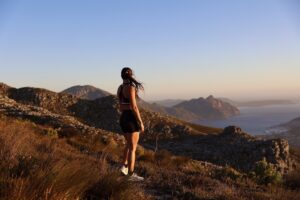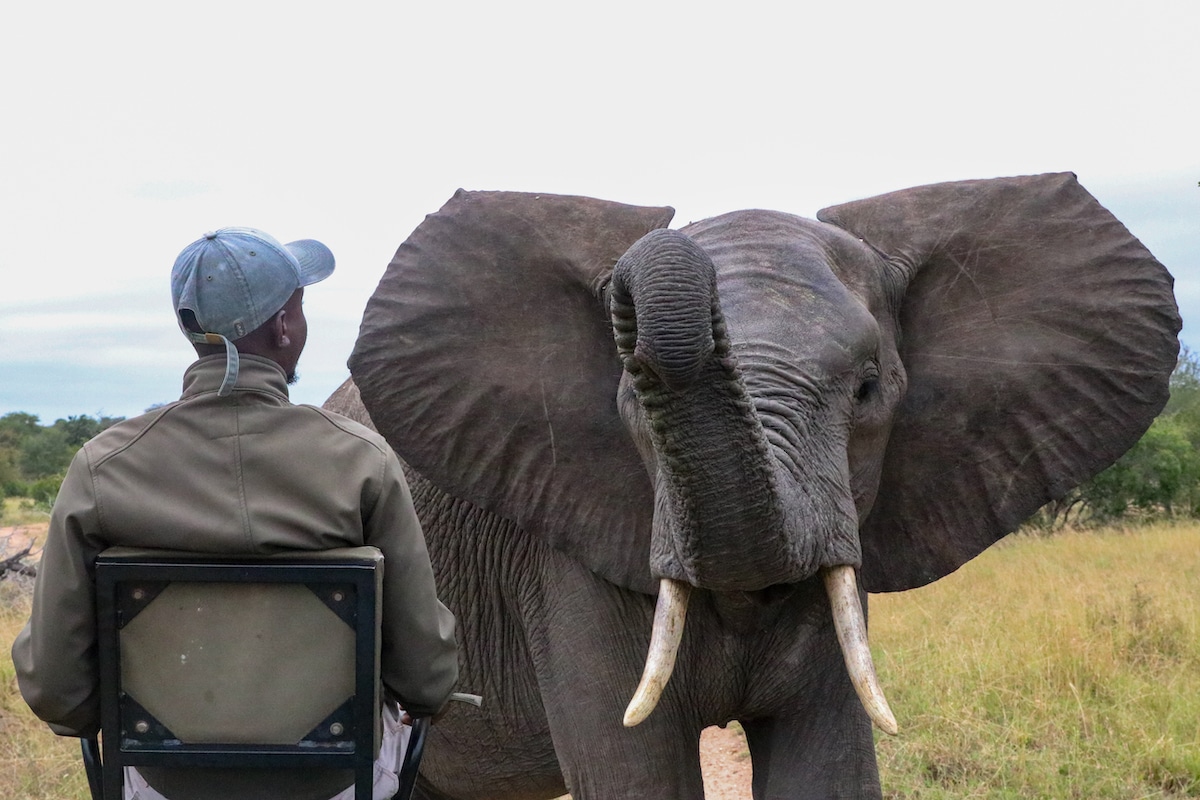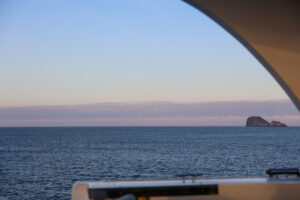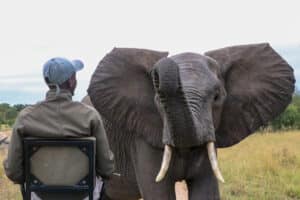

What is the most important thing to consider when deciding where to go on safari in South Africa? Sustainability. It’s vital to choose a safari company with a clear mission for conservation and a commitment to support the local community. What’s more, sustainable safaris allow visitors to feel connected to nature and experience awe-inspiring wildlife viewings.
We went on a truly special, sustainable safari with Umlani Bushcamp during our time in South Africa. Below, we share a full review of this eco lodge to help you plan your own South African safari.
Heads up: Links in this post are affiliate links. This means that if you click the link and make a purchase, we receive an affiliate commission at no extra cost to you. Your support helps us continue to travel the world and share our experiences, and for that we are forever grateful!
Seek out the private game reserves and conservation areas in the Greater Kruger area, which includes Kruger National Park. We recommend the Timbavati Nature Preserve, which is connected to the western boundary of Kruger (meaning that animals can roam freely across these lands).
Timbavati limits commercial development in the reserve and prioritizes the conservation of endangered species. Additionally, this privately owned reserve allows off-roading for certain animal sightings, and limits the number of vehicles that can view wildlife at one time. Below, we compare the Timbavati Nature Preserve to Kruger National Park to help you decide where to go on safari in South Africa.
When choosing a safari in South Africa, sustainability should be a top consideration. Ultimately, the best lodges are those that focus on protecting the environment, wildlife conservation, and supporting the local community that calls the place you’re visiting home.
Watch our video below for 5 things to know before booking your first safari in South Africa.
https://www.tiktok.com/@baggagegirls/video/7353716904042777902
Umlani Bushcamp has been sustainable from the very start, running an entirely off-grid operation. That’s right, this eco lodge has never had mainstream power, and today it runs on solar energy. What’s more, this safari lodge is family-owned and operated by two South African siblings, Marco and Micaela. Below we’ll break down just how Umlani checks all the sustainability boxes, with initiatives that prioritize people, the planet, and the environment.
As a reminder, sustainable travel includes (E) educating travelers, (C) conserving the natural environment, and creating (O) opportunity for the local economy. ECO is the acronym we often use when planning our travels to ensure we keep sustainability top of mind.
One of the best ways to ensure that your money goes to the local economy of the place you’re visiting is by choosing family-owned and operated hotels. Umlani Bushcamp was founded in 1990, but the land has been in the family for over 60 years, since 1963.
Furthermore, Umlani was founded by Marco and Marie-Louise Schiess, and the camp was designed around nature (quite literally, as the camp sits in the middle of the bush). Natural materials were used to minimize environmental impact. Today, Umlani’s character reflects this vision and guests can count on feeling closely connected to nature during their stay.
The Timbavati Nature Preserve is privately owned by a group of landowners focused on conservation. This collection of wilderness comprises over 200 square miles (53,000 hectares) and includes incredible biodiversity. You can spot all of the same animals on a safari in Timbavati that you can in Kruger National Park.
When deciding where to go on safari in South Africa, here are 4 things that set Timbavati apart:
To reach the Timbavati Nature Preserve in the Greater Kruger area, we recommend flying into Hoedspruit Airport. Airlink and Cemair are two airlines that run daily flights to Hoedspruit Airport from Johannesburg and from Cape Town.
From here, the ride to Umlani is just 40 minutes. You’ll want to arrange your transfer in advance, there won’t be taxis or Ubers waiting for you at this small airport upon your arrival.
We recommend arranging your transfer through Schoeman Tours and Safaris. Our driver was waiting for us with a sign when we got off our plane, and we were able to get right on the road.
Yolande, our driver, stopped many times to show us various wildlife on the drive to Umlani. Plus, he shared great information about the area.
Kruger: Kruger National Park encompasses 2,000,000 hectares (7,523 mi²). This is similar in size to the U.S. state of New Jersey.
Timbavati: Timbavati encompasses 53,396 hectares (206 mi²) of land.
Kruger: Kruger National Park dehorns rhinos in an attempt to make them less desirable to poachers.
Timbavati: Timbavati does not believe in dehorning rhinos. Going on safari in Timbavati means having the chance to see Rhinos in all their glory, with their horns.
Kruger: Kruger includes tar roads and allows visitors to go on self-driving safaris. There is no off-roading allowed and no set number of vehicles that can stop to view the wildlife at one time.
Timbavati: Timbavati includes dirt roads and only allows safari vehicles of the establishments within the reserve. Off-roading is allowed for the Big 5, meaning that your guides can take your group off the designated paths to allow you a closer look at the animals*. This reserve operates a ‘2 vehicle rule’ to limit the amount of cars viewing an animal at one time. Lastly, there is a 15 minute vehicle per window to protect the animals.
*Off-roading is carefully monitored in the Timbavati Nature Preserve. If there has been too much rainfall or the conditions are such that the enviornment could be significantly damaged, off-roading will be paused.
When deciding where to go on safari in South Africa, conservation efforts are an important consideration. All things considered, you’ll be spending a significant amount of money on this experience, so you want to ensure that your money goes toward a good cause. As travelers, we have a chance to positively impact the places we explore by putting our money toward worthy causes. One of the best ways to do that on a safari is to stay at a lodge with a focus on conserving the land and wildlife populations.
As part of the Timbavati, Umlani’s rhino conservation efforts focus on allowing the rhinos to keep their horns. This is done by protecting them with careful tracking and a dedicated anti-poaching unit.
Umlani Bushcamp is a true eco lodge – our absolute favorite style of accommodation. Going on a safari is about connecting to nature and experiencing wildlife in the wild. This camp is unfenced (except for wires to keep the elephants from entering), and located directly in the reserve. Below, we list some of Umlani’s best sustainability features:
Umlani is Fair Trade certified, focused on conserving wildlife and benefiting the local community. Fair Trade Tourism is a not-for-profit company that provides certification to sustainable tourism operators that adopt 6 key principles of responsible tourism.
Certifications are an excellent way to demonstrate that a safari company has gone above and beyond to prioritize sustainability in its practices.
Now that we’ve done a deep dive on the sustainability efforts of this eco lodge, let’s talk about the other factors that come into play when deciding where to go on safari in South Africa. The guest experience. Sustainability should never come at the expense of the your experience. In fact, we’ve found that eco hotels often offer an even more authentic guest experience. This is precisely the case at Umlani Bushcamp.
Umlani (Umhlani) means place of rest in Tsonga, the most widely spoken language in this region. This eco lodge embodies this name, offering guests an immersive experience in nature. Here, you can disconnect from modern technology and reconnect with yourself.
Let’s get to the good stuff. After all, you’re going on a safari to see wildlife in their natural element. This is what the game drives are all about. Umlani offers guests 2 game drives per day, one in the morning and one in the afternoon.
The first game drive begins promptly at 5:30-9:00 am every morning. The second game drive occurs from 4:00-7:00 pm each evening. This means that you’ll be lucky enough to watch both sunrise and sunset from the bush.
While this may sound like a long time in the vehicle, the time flies by as your guides traverse the Timbavati Nature Preserve. You’ll spend these hours encountering the Big 5 along with a range of other diverse wildlife, unique flora, and insects.
Umlani offers an all-inclusive safari package for guests. Your accommodation, 2 daily game drives, and 3 meals are all included with your stay. Additionally, you’ll have morning coffee and snacks in the bush, and evening sundowners and snacks in the bush. Alcohol is also included in your stay, with an open bar available in the Bush bar and deck area that overlooks a watering hole.
Booking an all-inclusive safari is sure to enhance your experience, as it allows for another level of relaxation.
Umlani Buschamp includes 8 reed and thatch huts, each with its own ensuite bathroom and open air shower. These huts include mosquito nets, which the staff carefully arrange for you as they make up your bed each night. Additionally, you can find crisp white linens, clean towels, and bathroom amenities provided for you. This accommodation provides the perfect blend of nature and comfort.
What’s more, Umlani has an optional treehouse stay, situated up in the middle of the bush. Guests can visit during the daytime. Or, get driven out at night to spend the evening under the stars, listening to the sounds of the animals. If you’re lucky, you just might spot a lion going in for a kill or a group of elephants wandering over to the watering hole.
The lovely staff at Umlani prepare delicious meals and are happy to accommodate dietary restrictions. We informed them that one person in our group was gluten free, and they made special breads and meals daily for us.
Additionally, they made us daily vegetarian meals to accompany the meat offerings. We loved watching the staff start a fire use the coals to heat the grill, as they prepared our meals each day. It served as a great reminder that we were using natural resources in a way that we have grown so unaccustomed to these days.
In our everyday lives, we’re surrounded by technology, noise, and busy lifestyles. When deciding where to go on safari in South Africa, choose a place that will help you get away from all of that. Focus on reconnecting with nature, and you’ll find that you leave feeling more closely connected to yourself.
How can you reconnect with nature on a safari? Sit in silence, listening to the sounds of the bush. Observe beautiful animals in their natural habitat. Catch the sunrise and sunset daily on your game drives. Gaze up at the stars. Let the calls of the animals in the distance lull you to sleep.
For all that’s included in this safari experience, Umlani Bushcamp offers quite an affordable safari. Below, we include approximate prices for stays of various lengths.
Other fees:
We stayed for 4 nights and were able to do 8 game drives in this amount of time. This price includes accommodation, 2 game drives per day, 3 meals per day, and all drinks.
These numbers reflect estimates of current prices in 2024, but are of course subject to change.
When considering where to go on safari in South Africa, there are no shortage of options. But for a sustainable, affordable, and authentic safari experience, Umlani Bushcamp is a fantastic choice. You’ll feel the magic of this place as soon as you arrive, and it will stay with you long after you leave. We can see why Umlani’s guests return year after year.
This family owned eco lodge offers an experience that you can’t get anywhere else, to connect with nature, observe amazing wildlife, and come away from the experience having learned more about the world – and our place in it.

Now more than ever, it’s possible to shop consciously without

If you want to visit the Galápagos Islands in 2025,

What is the most important thing to consider when deciding